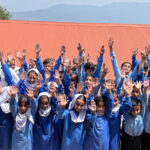Dr. Asaad Nafees, Assistant Professor in the Department of Community Health Sciences at the Aga Khan University (AKU), has performed an extensive research study to determine the efficacy of treatments for enhancing the health of Pakistani textile workers. The National Heart and Lung Institute (NHLI) and Imperial College London collaborated on this ground-breaking study, known as the MultiTex RCT, which is a significant step toward improving occupational health for textile workers in Pakistan and other Low- and Middle-Income Countries (LMICs).
Byssinosis, a respiratory ailment, is frequently brought on by cotton dust exposure among textile workers in LMICs. This is mostly because there aren’t many occupational health and safety measures available. The study, which included an initial cohort of 2031 workers from 38 textile mills in Karachi, sought to determine the effectiveness of a cost-effective intervention package in reducing the negative effects on these workers’ respiratory systems. All employees and managers received thorough training in occupational health as part of the interventions, which also included frequent refresher courses, the creation of workplace committees to enforce health and safety regulations including wet mopping and the appropriate disposal of cotton dust, as well as the provision of face masks. The findings showed that the textile workers’ respiratory problems and lung function had significantly improved.
The results of this study, which was supported by the Wellcome Trust for a three-year period, could benefit textile workers in Pakistan and elsewhere by increasing their safety and lowering the burden of disease. The study’s participant and former Imperial College London professor, Prof. Paul Cullinan, stressed the rarity and importance of studies on occupational health interventions. He emphasized how these varied approaches may be tailored to the local Pakistani environment and supported their wider use on a national and worldwide level in the fight against byssinosis. The principal investigator, Dr. Asaad Nafees, emphasized the potential for replication of this research throughout the area, which may improve the respiratory health of many workers and lead to a more healthy and effective workforce.
Engineer Sibtain Mughal, Joint Director Labor (OSH), Government of Sindh, recently presented the study’s key findings at a seminar and promised the government’s cooperation for following the health recommendations made by the study. Recognizing the significance of worker health’s impact on industrial production and the nation’s economy, he highlighted the necessity of giving it top priority.
The study has been described in numerous publications that have appeared in prestigious occupational health journals, and it has been accepted for publication in the European Respiratory Journal. The findings of this study have the potential to improve the well-being of textile workers and establish new benchmarks for occupational health interventions.







